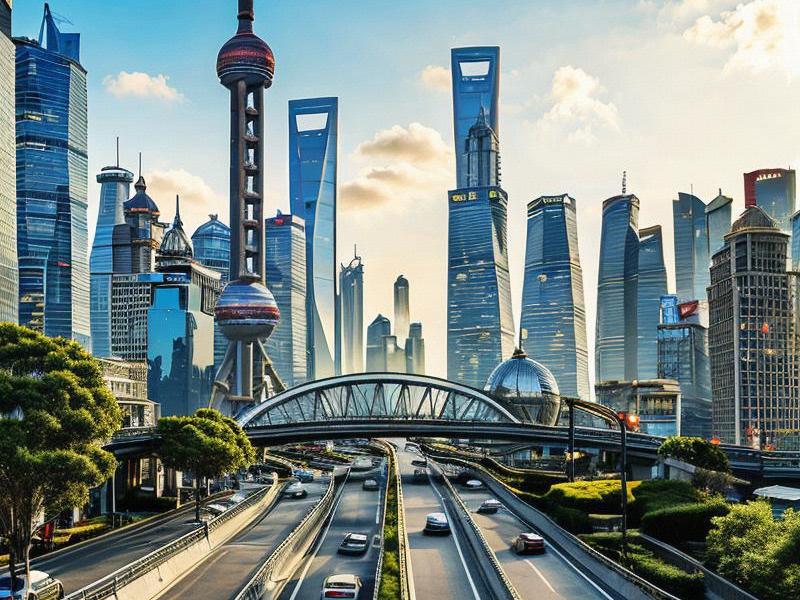
Shanghai, the bustling metropolis on the banks of the Huangpu River, has long been a symbol of China's rapid economic rise. Over the past few decades, this vibrant city has undergone a profound transformation, evolving from a traditional industrial base into a global hub of innovation and sustainability. Today, Shanghai stands as a testament to the power of urban planning, technological advancement, and environmental stewardship.
The Rise of a Global Financial Hub
One of the most striking aspects of Shanghai's transformation is its emergence as a global financial center. The city's skyline, dominated by iconic skyscrapers such as the Shanghai Tower, the Jin Mao Tower, and the Oriental Pearl Tower, is a visual representation of its economic prowess. These architectural marvels house some of the world's leading financial institutions, multinational corporations, and tech startups.
The establishment of the Shanghai Free Trade Zone (FTZ) in 2013 marked a significant milestone in the city's journey towards financial globalization. The FTZ introduced a series of regulatory reforms aimed at attracting foreign investment, simplifying customs procedures, and promoting trade facilitation. These measures have not only boosted Shanghai's status as a financial hub but also contributed to the overall economic growth of the Yangtze River Delta region.
Driving Innovation through Technology
Shanghai's commitment to innovation is evident in its thriving technology ecosystem. The city has become a magnet for tech companies, startups, and research institutions, fostering a culture of entrepreneurship and creativity. Zhangjiang Hi-Tech Park, often referred to as "China's Silicon Valley," is home to numerous high-tech enterprises, including Alibaba, Tencent, and Huawei.
夜上海最新论坛 The government's support for innovation is further demonstrated through initiatives such as the Shanghai Science and Technology Innovation Center. This center provides funding, resources, and infrastructure to support cutting-edge research and development projects. Additionally, the city's universities and research institutes are playing a crucial role in driving technological advancements, particularly in fields such as artificial intelligence, biotechnology, and green energy.
Urban Development and Smart City Initiatives
Shanghai's urban development strategy emphasizes sustainability and livability. The city has implemented a series of smart city initiatives aimed at improving the quality of life for its residents while reducing its environmental footprint. Smart traffic management systems, intelligent public transportation networks, and digital governance platforms are just a few examples of how Shanghai is leveraging technology to enhance urban efficiency and convenience.
One of the most ambitious projects in this regard is the construction of the Xiong'an New Area, a state-level new area located near Beijing. While not directly in Shanghai, this project reflects the broader national strategy of promoting balanced regional development. Shanghai, however, is also investing heavily in its own urban renewal projects, such as the Lujiazui Central Financial District and the Pudong International Airport expansion.
Environmental Protection and Green Initiatives
As a global leader in economic development, Shanghai recognizes the importance of environmental protection. The city has set ambitious targets for reducing carbon emissions, increasing energy efficiency, and promoting renewable energy sources. The implementation of the Paris Agreement on climate change has further strengthened Shanghai's commitment to sustainability.
上海贵人论坛 Green spaces and urban forests are becoming an integral part of Shanghai's urban landscape. The city has launched several initiatives to increase green coverage, including the construction of the Century Park, the Yangpu Riverside Park, and the Xuhui Riverside Park. These green spaces not only provide recreational opportunities for residents but also help mitigate the urban heat island effect and improve air quality.
Cultural Renaissance and Global Influence
Shanghai's transformation is not limited to economic and technological advancements. The city is also experiencing a cultural renaissance, embracing its rich history and heritage while fostering a vibrant contemporary culture. The Bund, a historic waterfront area, has been revitalized as a cultural and entertainment hub, hosting events such as the Shanghai International Film Festival and the Shanghai Fashion Week.
Shanghai's global influence is further enhanced through its role as a cultural and educational center. The city is home to numerous museums, art galleries, theaters, and universities, attracting visitors and scholars from around the world. The establishment of the Shanghai Cooperation Organization (SCO) has also positioned Shanghai as a key player in international diplomacy and cooperation.
Challenges and Future Prospects
上海娱乐 Despite its many achievements, Shanghai faces several challenges in its journey towards sustainable development. Rapid urbanization has led to issues such as housing shortages, traffic congestion, and environmental degradation. The city must continue to innovate and adapt to address these challenges and ensure long-term sustainability.
The future of Shanghai lies in its ability to balance economic growth with environmental protection and social equity. The government is exploring new approaches to urban planning, such as vertical cities and smart neighborhoods, to maximize land use efficiency and minimize environmental impact. Additionally, Shanghai is investing in education and skills training to prepare its workforce for the demands of a rapidly changing economy.
Conclusion
Shanghai's transformation is a remarkable story of resilience, innovation, and sustainability. From its rise as a global financial hub to its leadership in technology and environmental protection, the city is setting new benchmarks for modern urban development. As Shanghai continues to evolve, it serves as an inspiration for other cities worldwide, demonstrating that economic growth and sustainability can go hand in hand.
In the years to come, Shanghai will undoubtedly face new challenges and opportunities. However, with its commitment to innovation, urban planning, and environmental stewardship, the city is well-positioned to remain at the forefront of global development. Whether it's through cutting-edge technology, sustainable urban practices, or cultural renaissance, Shanghai's journey is a testament to the power of human ingenuity and determination.
